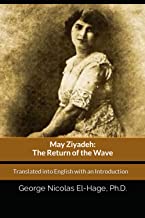May Ziyadeh: The Return of the Wave
May Ziyadeh (February 11, 1886 – October 17, 1941) was a Lebanese poet, essayist, journalist, novelist, accomplished translator, and the proprietor and administrator of one of the most successful literary salons in the Middle East during the first quarter of the twentieth century. She lived in Lebanon, Palestine, and Egypt, and it was in Egypt where she held her prestigious and celebrated literary salon, which attracted the elite of the Egyptian literary figures of the time. She was a giant scholarly figure who contributed immensely to the advancement of Arabic language and literature, both through her original writings and her translations of selected western works that helped revolutionize the thinking process of her contemporary scholars and writers.
May is considered one of the most influential and leading feminist voices in the Arab world during the first quarter of the twentieth century. She was open minded to other cultures and a driving force that helped propel the Women’s Liberation Movement to new heights. She devoted her career to women’s emancipation, equality, and education, but she also advocated for the intellectual freedom of men and for the justice and dignity of every individual on this planet. Throughout her career, she also maintained a distinguished relationship with two of the most celebrated authors of her time: Gibran Kahlil Gibran and Ameen al-Rihani.
This book is a tragic saga of a woman who is faced with the quintessential dilemma: should she return to the husband she loves who betrayed her and is remorseful or should she stay in a loveless relationship with a man who is loyal, forgiving, and compassionate?
In summary, the book is about a woman caught between love, passion, romance, and lust on the one hand, and reason, sound judgement, and common sense on the other hand. Her fight for freedom to love whomever she wants, to exercise her femininity, and to fulfill her romantic selfish desires even at the expense of her wounded pride collide with her social obligations, her religious beliefs, her instinct for motherhood, and above all her jealousy and anger for being betrayed twice.
May is considered one of the most influential and leading feminist voices in the Arab world during the first quarter of the twentieth century. She was open minded to other cultures and a driving force that helped propel the Women’s Liberation Movement to new heights. She devoted her career to women’s emancipation, equality, and education, but she also advocated for the intellectual freedom of men and for the justice and dignity of every individual on this planet. Throughout her career, she also maintained a distinguished relationship with two of the most celebrated authors of her time: Gibran Kahlil Gibran and Ameen al-Rihani.
This book is a tragic saga of a woman who is faced with the quintessential dilemma: should she return to the husband she loves who betrayed her and is remorseful or should she stay in a loveless relationship with a man who is loyal, forgiving, and compassionate?
In summary, the book is about a woman caught between love, passion, romance, and lust on the one hand, and reason, sound judgement, and common sense on the other hand. Her fight for freedom to love whomever she wants, to exercise her femininity, and to fulfill her romantic selfish desires even at the expense of her wounded pride collide with her social obligations, her religious beliefs, her instinct for motherhood, and above all her jealousy and anger for being betrayed twice.

